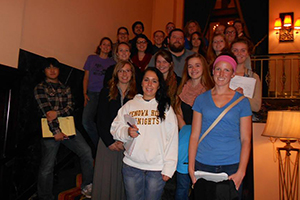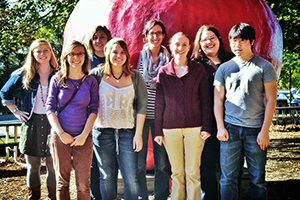Student Research: Sociology
Sociology: Hands-On Experience
Engaged Department Initiative
The Sociology Department is part of a nation-wide movement involved in transforming traditional “academic” curriculum into one centered on community engagement. We developed a systematic plan to incorporate community-based learning into the entire Sociology curriculum.
What does this look like?
At the introductory levels, this means exposing students to community issues and the people doing work in those areas. To illustrate: we approached the issue of poverty in all our Introduction to Sociology classes by discussing the extent of the problem, who is affected by it, and what sociological theories offer explanations for its persistence. Subsequently, we partnered with Feeding America, West Michigan, a non-profit organization whose goal is to provide “safe food” to people who are experiencing hunger in the community; they collect and provide 27.6 million pounds of food to local organizations who have direct outreach to the poor (e.g. food pantries, homeless shelters, schools, etc.). https://www.feedwm.org/whatwedo/ Feeding America representatives came to our classes and talked about the problem of hunger in our community and what their organization is doing to address it. In turn, our students offered their services to this organization by volunteering in programs for which Feeding America had identified a need. Linking academic discussions of poverty and hunger with hands on experience in the field and working with people who are trying to be part of the solution to this problem developed into an excellent way to provide a more comprehensive view of the issue.
At the intermediate levels, students participated in community-based learning in organizations in ways that reinforce and bring alive sociological theories and research. In Complex Organizations (SY 375), for example, student teams performed research with food-related businesses and agencies, such as Feeding America and the Cooperative Extension Service. (The latter project, in the upcoming year, will survey consumers who are members of CSAs. or Community Supported Agriculture in order to understand why they participate in these programs.) Social Stratification (SY312) offers another pertinent example. In this course students are expected to engage in a series of mini-ethnographies in which they collect information about stratification in a range of venues, from public transportation to neighborhoods across Grand Rapids, to homeless shelters, to country clubs. Analysis and discussion of observations formed in these settings serves as a useful tool for bringing home issues raised inside the classroom about topics relevant to stratification. The students also volunteer their time at the homeless shelter, again providing help to an organization that has provided the class with information about and contact with a population with which few students have had prior experience.
At the advanced levels, students become more thoroughly immersed in community-based learning. For instance, in SY/CL398, Sociological Practicum in Community Leadership, students become informed about a particular social problem (e.g. homelessness; domestic violence; healthcare; fair housing, etc.) and then work with an associated organization for 10-15 hours per week (a total of 150 hours); during the course they reflect on sociological dimensions of the issue in discussions with their professor. Through this type of community-based learning, students’ primary knowledge of the subject is shaped by their interactions with their community partner, reinforced by what they have learned in the classroom. This type of experience affords students the opportunity to gain in-depth knowledge of an issue at the same time that they contribute to the well-being of their community.
Our goal for this engaged initiative is to graduate students who have learned how to effectively engage in community work. This will make better citizens of our graduates and give them the skills to begin to address social problems they have studied and with which they have had first-hand experience.
One alum, Jessica McCormick, illustrates how the academic and practical aspects of this kind
of learning can lead to professional careers and social change. While a student at
Aquinas, Jessie interned with the Grand Rapids Coalition to End Homelessness. This
experience laid the foundation for additional work with the National Association for
the Education of Homeless Children and Youth (NAEHCY) in Washington, D.C. The culmination
of all of this experience led her to accept, upon graduation, a position with Sasha
Bruce Youthwork, an organization in Washington that is similar to Arbor Circle, offering
prevention and residential programs for homeless youth in the DC area. Jessie’s education
at Aquinas and the experience it provided her in participating with organizations
that serve homeless youth facilitated her move toward her present career.
Engagement Opportunities

Social Stratification students touring the operations at the Amway Grand Hotel

Social Stratification students on field trip
Complex Organization students at Gordon Food Service